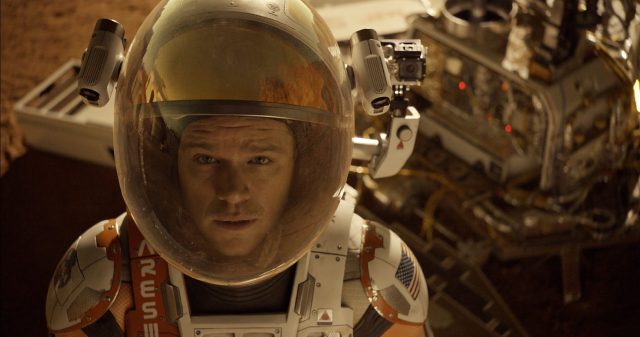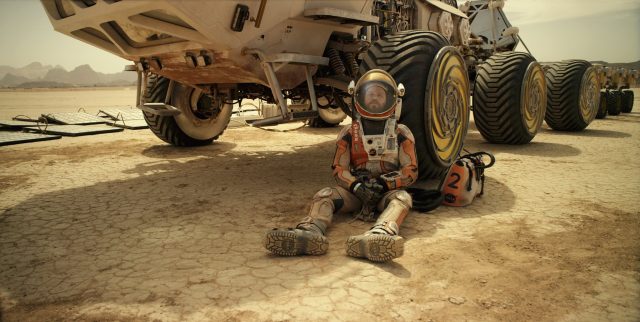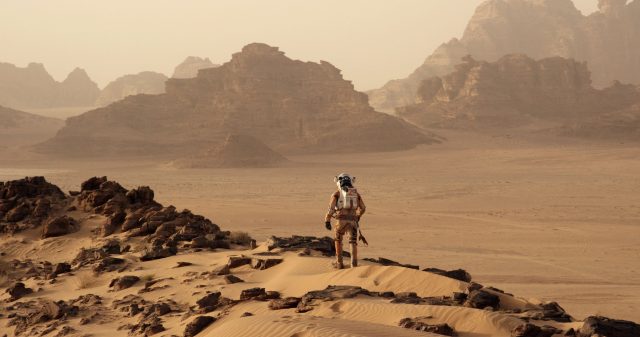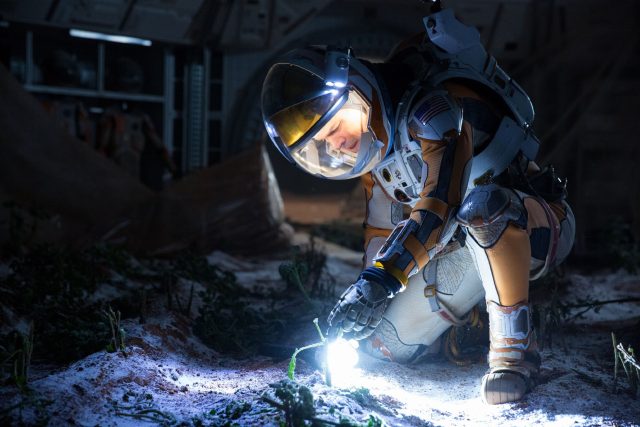
To get this out of the way right up front: we’re excited about the upcoming October release of Ridley Scott’s The Martian. Based on The New York Times Best Seller novel of the same name by first-time author Andy Weir, the story follows astronaut Mark Watney as he attempts to survive being left alone on Mars after a freak accident. The book has become a favorite here in the Ars Orbiting HQ—its mix of accurate science, humor, and solid storytelling has resonated with a large audience, and based on the trailers, the movie might just manage to be that most rare of things: a book-to-film adaptation that manages to be as good as the source.
Matt Damon was chosen to play Mark Watney, putting him in somewhat the same type of situation as Tom Hanks had to play in 2000’s Cast Away: a person who is utterly, completely alone. Some of the book’s fans expressed trepidation at Damon slipping on Watney’s spacesuit on the big screen, but author Andy Weir was thrilled at the idea when Ars interviewed Weir last November. "A lot of people forget how good an actor Matt Damon is!" explained Weir. "Remember, he can do 'smartass' really well, as we saw in Good Will Hunting!…and I can see him in my mind, saying smart-ass things, kind of with that crooked smile, you know?"
No man is an island
Although we haven’t seen the film yet (though we’re on the press screening list!), we had the opportunity to talk with Matt Damon earlier this week about how he handled the role and what he thought about Mark Watney and life on Mars.
Much like how Weir had praise for Damon, Damon had great things to say about Weir, right out of the gate. When I asked if the role of Mark Watney was an easy one to inhabit, Damon was quick to agree. "Oh yeah," he said, "because it was so well written. And then the script that Drew Goddard wrote—the adaptation—I thought really retained the best parts of the book. It just felt like putting on an old pair of shoes—it was really all there on the page."

One particularly interesting aspect of Mark Watney’s character is that he seems oddly immune to the crippling depression that would take hold of just about any other person marooned on Mars. While stuck by himself on the red planet, Watney is very literally the most isolated person to ever live—about a thousand times farther away from any other human being than the Apollo astronauts were when they visited the Moon.
Weir made a conscious decision to avoid dealing with a lot of that. "I didn’t want the book to be a deep character study of crippling loneliness and depression," he explained to Ars. "I just said like, 'Nope, that’s not how Mark Watney rolls.'"
Damon explained that Director Ridley Scott wanted to take somewhat a different tack from the book, embracing the imagery of the lone human on a vast empty stage. "That was one of the big conversations that Ridley and I had in the very beginning—how do we retain all the humor and the fun from the book and keep the movie really entertaining, without losing the reality of the fix that this guy is in?" Damon said. "And how do we keep that tension and keep those stakes as high as possible? So that was really kind of the tonal dance of the movie and what we were really focused on."
He highlighted the 2003 film Touching the Void as an example of a film that dealt well with existential dread and crushing loneliness—he and Ridley Scott both wanted some of that film’s flavor, but without losing sight of The Martian’s humor and upbeat tone.
"So Ridley added these moments of, you know, sitting there and just listening to the wind rattle the hab one night," said Damon. "And also a lot of the big vista shots, where my character or the rover that I’m in is just really small in the frame, against a giant background of this really inhospitable planet. Moments like that to keep that dread and that terror live, without losing the fun."

How do you like them potatoes?
If there’s a costar in the movie along with Mark Watney, it’s science. Author Andy Weir famously put in months of painstaking research on potential ways Watney could survive on Mars, working out detailed math and procedures on how and what to do. Damon was quick to assure us that Weir’s efforts didn’t go to waste and that the science remains the star in the movie as well.
"When we made the movie, we had to go through step by step," he said. "He [Watney] is very logical and practical and methodical in how he goes about surviving. He says, essentially, 'I need air, water, and food, and what do I need to do to ensure I have those things?' And then kind of lets the science bring you there."
When asked if there were any of Watney’s science survival experiments that were difficult do get right on-screen, Damon paused for a moment. "Well, I mean, obviously we had to grow potatoes on the soundstage while we were shooting—"
I interrupted him with laughter. "You actually grew potatoes?"
"Yeah, yeah!" he responded enthusiastically. "Because there are all these scenes with potatoes at various stages of growth. The only way we could do that was to actually grow potatoes."

The potatoes are another key element in the story—Watney winds up subsisting on Mars-grown potatoes, and the struggle to grow them makes up a big chunk of the first half of the story. I jokingly asked if Ridley Scott’s commitment to verisimilitude extended to having the potatoes fertilized in the same way Watney had to do it—it’s pretty much exactly how you might imagine—and Damon started laughing.
"No! That was kind of like a chocolate reduction I was using on-screen, thank God!"
Space race
Even though the film isn’t out yet, it’s already being called a huge PR coup for NASA. As the book did, it casually paints a picture of a massively empowered future version of the agency with the financial and technical means to launch an entire string of manned Mars missions without the need for co-funding by international partnerships. Weir explained that he wrote it this way primarily for convenience’s sake, so that he could show the decision-making going on back on Earth without having to invent some kind of international governing council; however, it ends up showing the NASA as many space enthusiasts wish it existed, rather than the agency that we actually have.

In the film, Damon’s character is part of the third crewed mission to Mars, and when I asked Damon what he thought of the feasibility and desirability of an actual Ares-style mission to Mars, he turned pensive. "I can’t really speak to the feasibility—I know they’re planning on doing it about 20 years from now," he said, referring to NASA’s proposed SLS-based Mars landing.
"It certainly seems like a worthwhile endeavor," he continued. "I think we have to acknowledge that we need to get some of our species off this planet so that we’re not one catastrophic event away from humanity never having existed. So I think it’s worth it. I would think putting our resources there is money well spent."
Here be spoilers!
As the conversation wound down, I had one final question to ask the man who brought Mark Watney to life. Andy Weir told me that many readers e-mailed him after finishing the book asking what happened to Mark Watney after his rescue—and he was surprised to discover how many of those readers demanded to know if Watney ended up with Mindy Park, the NASA imagery analyst who first discovers Watney is alive on Mars and who is assigned to watch over him.
Weir told me that he had no plans for a sequel, but that if he does write one, "Mark and Mindy" will definitely be a couple. Damon hadn’t heard of this, and he started laughing.
"I like Mark and Mindy!" he said. "When I signed up for this, I hadn’t intended to do a sequel—but now that I’ve heard about Mark and Mindy I think I might have to."
The Martian will be in theaters in the US on October 2. It is not yet rated (but we’re betting on PG-13).
reader comments
110